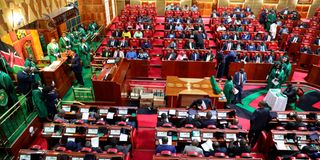History made but gender parity in parliaments far from reality

Kenya's National Assembly. For the first time in history, no functioning parliament in the world is comprised of men only, according to the latest Inter-Parliamentary Union report.
What you need to know:
- Inter-Parliamentary Union (IPU) report, Women in Parliament 2022, has recorded a positive trend, albeit small, in women’s participation in parliaments globally.
- In the 47 countries that conducted elections last year, women took an average of 25.8 per cent of seats up for election or appointment, a 2.3 per cent increase compared to the previous polls in those countries.
For the first time in history, no single functioning parliament in the world is comprised of men only. This is according to the latest Inter-Parliamentary Union (IPU) report, Women in Parliament 2022, which recorded a positive trend, albeit small, in women’s participation in parliaments globally.
In the 47 countries that conducted elections last year, women took an average of 25.8 per cent of seats up for election or appointment, a 2.3 per cent increase compared to the previous polls in those countries.
Australia is the only country in the world where women won more than half of the seats, 56.6 per cent of its upper house.
Six countries, up from five, had gender parity in their lower houses as of January 1, 2023. New Zealand became the latest entrant, joining Cuba, Mexico, Nicaragua, Rwanda and the United Arab Emirates (UAE) that had achieved this feat.
Despite the progress, 2022 was also the first time in six years when women’s representation advanced the slowest, growing by only 0.4 percentage points to 26.5 per cent. By the end of the year, in only 64 countries did women hold 30 per cent or more seats in their lower houses, three more than in 2021.
Long journey
If these trends are to continue, it will take 80 more years to achieve parity.
“Every woman who is elected brings parliaments one step closer to becoming more inclusive and representative,” said President of the IPU Bureau of Women MPs Lesia Vasylenko, in a press statement.
“And it’s great to see much more diversity this year in many elections around the world. But overall, progress is far too slow, with half the world’s populations still vastly underrepresented. There is an urgent need to change this to strengthen democracy everywhere.”
Also read: MPs back Ruto’s House gender rule proposal
Technology was singled out as an enabler in increasing women’s participation. The report indicated that technological and operational transformations have increased the potential for parliaments to become more gender-sensitive and family-friendly.
Still, women face many barriers that limit their entrance into politics and in other cases forcing them to leave the scene too quickly. These include sexism, harassment and violence.
According to IPU Secretary General Martin Chungong, it would take political will at the highest level to make gender equality a reality by utilising available data, tools and solutions to attain parliaments that are gender-sensitive.
IPU President Duarte Pacheco, for his part, called upon men to support women to achieve diversity in parliaments more quickly. “The only way to make real progress toward achieving gender equality in parliaments is to share the responsibility between men and women.”




